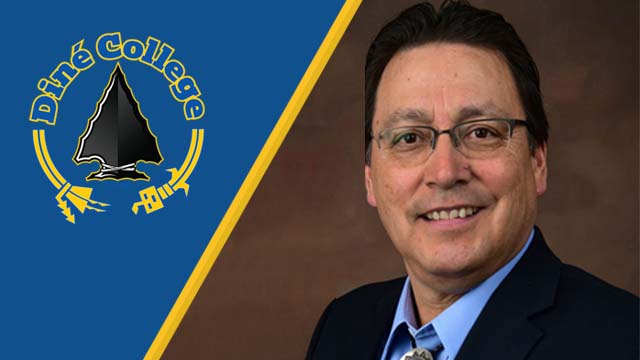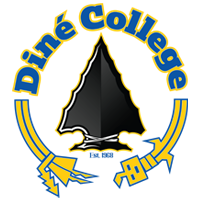
Diné College President Testifies Before Federal Native Youth Commission
FOR IMMEDIATE RELEASE
Dec. 16, 2020
TSAILE, Ariz. — As president of Diné College, and as a former teacher, principal and superintendent at schools across the Navajo Nation, Charles Monty Roessel can identify with youth who fit the criteria under review by the federal Alyce Spotted Bear and Walter Soboleff Commission of Native Children.
The Native Children Act was signed into law by President Barack Obama in 2016, and created the commission to undertake a widespread study of federal, state, local, and tribal programs that serve Native American children, and make recommendations to the U.S. Congress on how those programs — and, ultimately, the plight of Native children, can be improved.
Roessel was among the numerous educators, politicians and community leaders from Indian Country who recently testified before the commission — reminding the panel to not shortcut Native youth problems and solutions.
“I will not bother to recite the daunting statistics facing our Native children, which are amply cited by report after report throughout the years,” Roessel told the body. “We cannot begin to address the challenges facing our Native children, unless we recognize the need for a holistic approach. In order to have any lasting impact on improving Native children’s future, we must look past territories, boundaries, and silos.”
Roessel used an early childhood education analogy which shed light on improving one federal agency at the expense of another.
“The Bureau of Indian Education, the Department of Health and Human Services and the Department of Education have programs that focus on pre-K education,” Roessel explained. “Yet, because of specific eligibility requirements, the need is never met because the conditions are written for a different part of the country — but not Indian Country. As the past superintendent of Rough Rock Community School (Rough Rock, Ariz.), I dealt with this first hand with our Family and Children Education (FACE) program competing for Head Start students to the detriment of both programs. What is the result? Young students being in neither program nor receiving the education they deserve, need and are entitled to. This is but one example, but it illustrates the impact of well-intentioned programs not being looked at holistically.”
Roessel said Diné College follows the philosophy of Są’ah Naagháí Bik’eh Hózhóó — which reflects on how everything is related. The coronavirus (COVID-19) demonstrates this more than ever, he said.
“What we know instinctively is integral to the smooth functioning of our society. For example, the need for early childhood education is more than just an education issue. It is also a child care issue, a health care issue, and an economic issue.”
He shared some insight on what tribal colleges and universities (TCU’s) are currently doing right now:
“Food sovereignty reflects what TCU’s are doing to impact Native children positively. TCU’s allow Native children to learn about their identity, improves the economic environment for Native peoples, improves the health of Native peoples and maybe most importantly, shows that solutions can and do come from within Indian communities. As a land grant institution, our college offers community members culturally-based agricultural education to improve economic development and encourage healthy eating. This does is provides a sort of supplemental income to families.”
Roessel used the examples of community gardening and the college creating an agricultural science degree to buttress the point. Roessel noted that an agricultural hub planned for the college’s Shiprock campus is a place whereby families can receive guidance, answers and information about healthier eating and on the growing traditional foods — while learning the culture and history of such a part of Navajo.
“Rather than looking for a single solution, the focus on supplemental income is a game- changer for a family that can increase their income by 20% by using their farmland,” Roessel explained. “A founding mission of all TCU’s is the teaching and learning of Native culture and language.”
Said Roessel: “Diné College was founded more than 52 years ago with a mission to be the higher education institution for the Navajo people – not the nation. This is important because it reflects the need to remember that individuals build the nation and tribal colleges and universities have at its foundational core the mission to build strong Indian nations. This of course cannot be done without addressing the needs of our children.”
The Alyce Spotted Bear and Walter Soboleff Commission on Native Children, established by the U.S. Congress, is charged with conducting a comprehensive study of the programs, grants and supports available for Native children, including American Indian, Alaska Native and Native Hawaiian children, both at government agencies and on the ground in Native communities.
The 11-member Commission seeks to examine the unique challenges Native children face and make recommendations on improving the current system by building on the strengths and leadership of Native communities, In the end, a report will be done with recommendations on how to achieve better outcomes for Native children. The Alyce Spotted Bear and Walter Soboleff Commission began its work in 2019. The Commission is named after the former Chairwoman of Mandan, Hidatsa and Arikara Nation in North Dakota, and for the Alaska Native elder and statesman.
